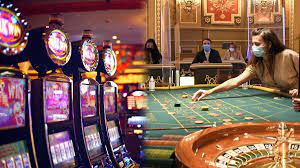Casinos have long fascinated people around the world, https://en-casino.com evolving from simple games of chance in ancient civilizations to sprawling entertainment complexes. This article explores the evolution of casinos, highlighting their historical development, technological advancements, and the diverse experiences they offer today.
Ancient Origins
The concept of gambling dates back to ancient times, with evidence suggesting that early forms of casino-like games were played in China and Rome. In China, dice games were popular, and by 2300 BC, the Chinese were using dice in gambling activities. Similarly, the Romans enjoyed various games of chance, including dice and board games. These early forms of gambling laid the groundwork for the development of more sophisticated gaming establishments.
The Birth of Modern Casinos
The first true casino, as we understand it today, was established in Venice, Italy, in 1638. Known as the Casino di Venezia, it was a small, private venue offering a variety of games to its patrons. This establishment marked the beginning of the modern casino industry, providing a formal setting for gambling and entertainment.
In the 19th century, casinos began to spread across Europe, with notable examples including the Casino de Monte-Carlo in Monaco, which opened in 1863. The Monte-Carlo casino was instrumental in popularizing casino gaming and attracting affluent visitors from around the world. This period also saw the rise of iconic games such as roulette and baccarat, which became staples in casino gaming.
The American Casino Boom
The 20th century brought significant changes to the casino industry, particularly in the United States. In 1931, Nevada legalized gambling, leading to the establishment of Las Vegas as the premier casino destination. The development of the Las Vegas Strip in the 1940s and 1950s transformed the city into a global hub for casino entertainment, featuring lavish resorts and a wide range of gaming options.
The popularity of casinos in the U.S. continued to grow, with other states eventually legalizing gambling and creating their own casino industries. Atlantic City, New Jersey, became a major casino destination in the 1970s, and tribal casinos across the country began to emerge in the late 20th century, further diversifying the casino landscape.
Technological Innovations
The late 20th and early 21st centuries have witnessed significant technological advancements in the casino industry. The introduction of online casinos has revolutionized the way people experience gambling, allowing players to access games from the comfort of their homes. Online casinos offer a wide range of games, including slots, poker, and blackjack, and use advanced software to ensure fair play and security.
Additionally, land-based casinos have embraced technology with the integration of electronic gaming machines and sophisticated surveillance systems. Innovations such as virtual reality (VR) and augmented reality (AR) are also beginning to play a role in creating immersive gaming experiences.
The Modern Casino Experience
Today’s casinos are more than just places to gamble; they are comprehensive entertainment destinations. Many modern casinos offer luxury accommodations, fine dining, live entertainment, and shopping, creating a complete leisure experience for visitors. The emphasis has shifted from purely gambling to providing a broad range of activities and amenities, catering to a diverse clientele.
Casinos also play a significant role in local economies, contributing to job creation and tourism. They have become integral parts of many cities and regions, driving economic growth and development.
Conclusion
The evolution of casinos reflects broader trends in entertainment, technology, and societal values. From their ancient origins to the sophisticated entertainment hubs of today, casinos have continually adapted to meet the needs and desires of their patrons. As technology and consumer preferences continue to evolve, the casino industry is likely to experience further transformations, continuing its legacy as a dynamic and captivating aspect of modern life.

